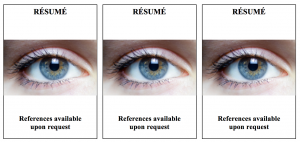Resume tip #6: Don’t plagiarize
Previous posts in series:
- Resume tip #1: Use numbers to tell stories about your accomplishments
- Resume tip #2: Eliminate grammar and spelling errors
- Resume tip #3: Don’t use unusual colors (or get too fancy in other ways)
- Resume tip #4: Include or do not include an objective in your resume, depending on the circumstances
- Resume tip #5: Don’t concoct appealing but spurious details or falsely embellish (i.e., lie)
 Today’s tip is related to our last post about lying on the resume, since people who plagiarize on their resumes often also lie. I.e., they copy material from other people’s resumes and say it’s true about themselves, even if it’s not. Obviously, this is unacceptable.
Today’s tip is related to our last post about lying on the resume, since people who plagiarize on their resumes often also lie. I.e., they copy material from other people’s resumes and say it’s true about themselves, even if it’s not. Obviously, this is unacceptable.
But there are other ways to plagiarize that don’t involve telling lies per se:
- Copying passages from other resumes and replacing the details with one’s own.
- Using someone else’s Microsoft Word document to create one’s own resume (using the format but replacing the information).
- Mimicking someone else’s unique and original resume format to excess (this does not include classic formats and widely recognized ways of organizing content).
There is a wide spectrum of dishonesty possible here. For example, if you are graduating college and your big brother lets you use his Microsoft Word doc as a format for your first resume, you have permission, and that’s not a problem. On the other hand, finding a resume online and simply changing the name and contact information is a problem.
Aside from the matter of right and wrong, the main reason not to plagiarize when writing a resume is the possibility of getting caught. Hiring managers and recruiters see a lot of resumes, and if something looks fishy, they will google it and compare it to other resumes they have seen. If the swiped content was taken from an online source, the chance of it being located is quite high.
When writing a resume, it’s best to play it safe and honest: plagiarism is a no-no!
Matt
The Key Corporate Services Blog Team
Eye photo by Laitr Keiows
